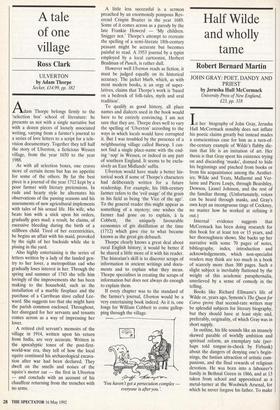A tale of one village
Ross Clark
ULVERTON by Adam Thorpe Secicer, £14.99, pp. 382 Adam Thorpe belongs firmly to the 'selection box' school of literature: he presents us not with a single narrative but with a dozen pieces of loosely associated writing, varying from a farmer's journal to a series of love letters to a script for a tele- vision documentary. Together they tell half the story of Ulverton, a ficticious Wessex village, from the year 1650 to the year 1988.
As with all selection boxes, one craves more of certain items but has no appetite for some of the others. By far the best piece is a journal of the year 1712 kept by a poor farmer with literary pretensions. In rude and hearty style he alternates his observations of the passing seasons and his assessments of new agricultural implements with tales of his sexual life. His wife, who beats him with a stick upon his orders, gradually goes mad; a result, he claims, of excessive bleeding during the birth of a stillborn child. Tired of her eccentricities, he begins an affair with his maid, provoked by the sight of her backside while she is pissing in the yard.
Also highly entertaining is the series of letters written by a lady of the landed gen- try to her lover, a metropolitan cad who gradually loses interest in her. Through the spring and summer of 1743 she tells him lovingly of the improvements she has been making to the household, such as the installation of a marble fireplace and the purchase of a Carribean slave called Lee- ward. She suggests too that she might have the parish common enclosed. Throughout, her disregard for her servants and tenants comes across as a way of impressing her lover.
A retired civil servant's memoirs of the village in 1914, written upon his return from India, are very accurate. Written in the apocalyptic tones of the post-first- world-war era, they tell of how the local squire continued his archaeological excava- tion after war had been declared. They dwell on the smells and noises of the squire's motor car — the first in Ulverton — and conclude with an account of his chauffeur returning from the trenches with no arms. A little less successful is a sermon preached by an enormously pompous Rev- erend Crispin Brazier in the year 1689. Some of it comes across as a parody by the late Frankie Howerd — 'My children.
Snigger not.' Thorpe's attempt to recreate the spelling of a semi-literate 18th-century peasant might be accurate but becomes painful to read. A 1953 journal by a typist employed by a local cartoonist, Herbert Bradman of Punch, is rather dull.
However well Ulverton reads as fiction, it must be judged equally on its historical accuracy. The jacket blurb, which, as with most modern books, is an orgy of super- latives, claims that Thorpe's work is 'based on a bedrock of folk-tales, myth and oral tradition'.
To qualify as good history, all place names and dialects used in the book would have to be entirely convincing. I am not sure that they are. Thorpe does well to vary the spelling of 'Ulverton' according to the ways in which locals would have corrupted it. But I was troubled by the presence of a neighbouring village called Bursop. I can- not find a single place-name with the end- ing `-sop' in Wessex, or indeed in any part of southern England. It seems to be exclu- sively an East Midlands' suffix.
Ulverton would have made a better his- torical work if some of Thorpe's characters had deliberately written for a future readership. For example, his 18th-century farmer refers to the 'evil usage' of the grain in his field as being 'the Vice of the age'.
To the general reader this might appear as something of a mystery; one wishes the farmer had gone on to explain, a la Cobbett, the uniquely favourable economics of gin distillation at the time (1712) which gave rise to what became known as the great gin debauch.
Thorpe clearly knows a great deal about rural English history; it would be better if he shared a little more of it with his reader.
The historian's skill is to discover scraps of information in ancient writings and docu- ments and to explain what they mean. Thorpe specialises in creating the scraps of information but does not always do enough to explain them.
If every chapter was to the standard of the farmer's journal, Ulverton would be a
very entertaining book indeed. As it is, one longs for William Cobbett to come gallop- ping through the village.
'You haven't got a persecution complex — everyone is after you.'.


















































 Previous page
Previous page